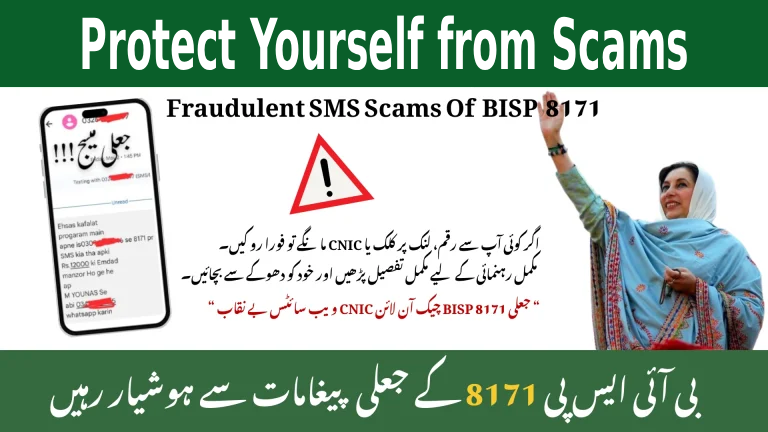
Introduction paragraph:
The rise of BISP SMS fraud has become a significant concern for beneficiaries of the Benazir Income Support Programme (BISP). Many people fall victim to fraudulent SMS messages and fake websites pretending to offer BISP services, such as the 8171 CNIC check. Understanding the nature of BISP SMS fraud and the legal actions taken against such scams is essential for protecting oneself and ensuring the security of personal information. This article sheds light on this critical issue, providing clear guidance on how to avoid falling prey to these scams.
SEO Outlines with well-explained sections:
What is BISP SMS Fraud?
BISP SMS fraud involves scammers sending fake text messages that mimic official BISP alerts. These messages often request sensitive personal information like CNIC numbers, PINs, or ask recipients to click on suspicious links. The fraudulent messages may appear to come from the official 8171 shortcode but are designed to steal personal data or money from vulnerable beneficiaries. Recognizing the differences between legitimate and fake messages is the first step in safeguarding oneself from these scams.
How Scammers Operate in BISP SMS Fraud
Scammers create fake websites and send counterfeit SMS messages posing as the BISP or its official 8171 number. They lure victims by promising quick results for eligibility or payment status checks. These fake portals collect personal data and sometimes charge registration fees, which BISP never does. Using unofficial methods puts beneficiary information at risk of theft and misuse.
Official Methods to Verify BISP Payments and Status
The safest way to check BISP payment status is via the official 8171 SMS service by sending your 13-digit CNIC number without spaces or dashes. Alternatively, beneficiaries can visit official BISP offices for verification. No fees or charges are involved in this process, and any message requesting payment or extra fees is a scam.
Legal Actions Addressing BISP Fraud
Legal mechanisms have been set up to counter BISP fraud. The Benazir Income Support Programme collaborates with the Pakistan Telecommunication Authority (PTA) and law enforcement agencies to prosecute culprits involved in fraudulent activities. Cybercrime laws are enforced to deal with perpetrators, and victims are encouraged to report suspicious activity through official helplines such as 0800-26477.
How to Protect Yourself from BISP SMS Fraud
Beneficiaries should never share CNIC, banking details, or PINs via SMS or online forms unless verified through official channels. Avoid clicking on suspicious links and always confirm information through authorized BISP contacts. Reporting suspicious SMS or websites to BISP or PTA helps prevent others from becoming victims.
Signs of a BISP SMS Scam to Watch Out For
Key red flags include messages from numbers other than 8171, requests for money or registration fees, and links to unofficial websites. Genuine BISP communication comes only from 8171, and no payment is ever required for surveys or eligibility checks.
What to Do if You Receive a Suspicious BISP SMS
Do not respond or provide any personal information. Report the message immediately to the BISP helpline. Change passwords and monitor financial accounts if any sensitive data was shared unintentionally. Staying vigilant is critical to avoiding further fraud.
BISP’s Ongoing Efforts to Enhance Beneficiary Safety
BISP Chairperson and officials continuously engage with PTA and other agencies to improve fraud detection and beneficiary support. They provide public awareness campaigns to educate recipients about safe practices and how to identify fake communications.
FAQs:
Q1: How can I verify the authenticity of a BISP SMS?
A1: Always verify that the SMS comes from the official 8171 number. Check your status by sending your 13-digit CNIC via SMS to 8171. Avoid responding to messages from unknown numbers.
Q2: What should I do if I accidentally shared my CNIC or banking details in a scam SMS?
A2: Immediately contact the BISP helpline at 0800-26477 to report the incident and seek guidance. Monitor your financial accounts for any unauthorized activity.
Q3: Does BISP ever charge fees for surveys or registration?
A3: No, BISP does not charge any fees for surveys, registration, or eligibility checks. Any message requesting money is fraudulent.
Q4: How is the government combating BISP SMS fraud?
A4: BISP collaborates with the Pakistan Telecommunication Authority and law enforcement to identify and prosecute scammers under cybercrime laws.
Q5: Where can I report suspicious BISP-related SMS or websites?
A5: Suspicious activity can be reported to the BISP helpline at 0800-26477 or the Pakistan Telecommunication Authority for investigation.
Conclusion:
BISP SMS fraud poses a real threat to vulnerable beneficiaries seeking financial support. Staying informed about the official channels, recognizing scam signs, and knowing the legal actions in place can protect individuals from falling prey to these fraudulent activities. By following safe practices and reporting suspicious messages, beneficiaries can ensure their security and continue to benefit from BISP without fear. Awareness and vigilance remain the best defenses against BISP SMS fraud and related scams.